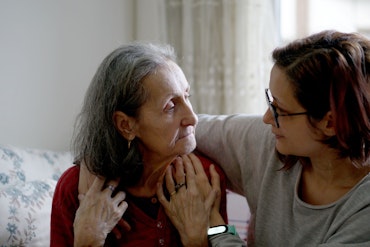Could pandemic planning for vulnerable people replace the need for vaccines?
Do you believe selective lockdowns are unfair to older people?
![<p>Lockdowns in Australia led to an increase in social isolation among older people. [Source: Shutterstock]</p>](https://agedcareguide-assets.imgix.net/news/articles/wp/lockdownold__0902.jpg?fm=pjpg&format=auto&w=550&q=65)
Lockdowns in Australia led to an increase in social isolation among older people. [Source: Shutterstock]
Key points:
- During the pandemic, 10 percent of people over the age of 70 also reported having less-than-weekly contact with loved ones, compared to just 4 percent of people under 40
- Three-quarters of all COVID-19-related deaths in the first year of the COVID-19 pandemic were among people living in residential aged care
- Most of Australia’s residential aged care homes experienced a COVID-19 outbreak during 2021 – ‘22
Academics from La Trobe University have claimed that the model for preventing a future pandemic might not be worth the ethical risk of locking up older people and letting non-vulnerable populations develop a form of herd immunity.
Increasing the exposure of one group to a disease would create an ethical dilemma and potentially result in the most disadvantaged groups in the community — usually with the least political power — becoming the highly infected group, according to disease modellers.
Associate Professor of Mathematics and Statistics Dr Joel Miller explained the pros and cons of strategic pandemic planning.
“With COVID-19, the elderly were at high risk, so if we were to isolate them for a period of time, during which we enact policies that would cause younger age groups to interact more — not less, then the disease likely would not spread well once the isolations were lifted and interactions returned to normal,” Dr Miller said.
“If we set aside the question of whether such a strategy is logistically feasible, in a sense this is an optimal intervention. However, there are major ethical challenges that result — the intervention makes younger age groups worse off from an infection point of view.
“Our goal in this paper is not to advocate for such a policy, but rather to highlight some ethical dilemmas that emerge from intervention strategies. It is important that policy makers recognise the trade-offs that an ‘optimal’ strategy might require.”
Researchers involved with the study, titled ‘Ethical dilemma arises from optimising interventions for epidemics in heterogeneous populations,’ grouped people into three groups which assumed individuals in the population are ‘susceptible,’ ‘infected’ or ‘recovered — with immunity’ to study the optimal way to decrease community risk.
Using data from a Netherlands survey that determined how often people in different age groups came into contact with each other, the researchers simulated different scenarios to determine the best outcome for an entire population, assuming that an intervention altering the contacts would be in place for a limited time.
It found that if the intervention, such as social isolation or lockdowns, did not reduce contacts sufficiently then a large epidemic would occur. However, if the intervention reduced contacts too much there would be a modest epidemic and once the intervention was lifted, many individuals would still be at risk and a second wave would occur.
The optimal intervention occurs where contacts are reduced so that the initial epidemic is as small as possible while still infecting enough people to prevent a second wave.
“This calls for a discussion around the ethics of subjecting certain groups to a higher rate of disease incidence and the feasibility of this policy,” the study noted.
Dr Miller said this was the first study to consider the ethical implications of an increase in infections as a strategy for optimal outcomes, without the use of vaccines.
“The intervention strategy presented here always carries such risks with it and representation of disadvantaged groups thus becomes essential, especially for a policy such as this one,” the study added.
On March 18, 2020, the Australian Federal Government announced a list of restrictions for residential aged care facilities, including restrictions on visitor access, the need for social distancing and the use of personal protective equipment to help stop the spread of COVID-19.
Research published in 2023 has revealed that early intervention in Australia may have contributed to the lower death rate among people living in residential aged care facilities compared to the United Kingdom.
Older Australians who were surveyed about public health guidelines and lockdowns expressed approval, however, participants raised concerns about weakening social ties and prolonged social isolation during the pandemic.
Would you prefer strategic planning to a new vaccine if a new pandemic kicked off in Australia? Let the team at Talking Aged Care know and subscribe to the newsletter for more information, news and industry updates.
Related content:
COVID-19 rebound – what is it?























